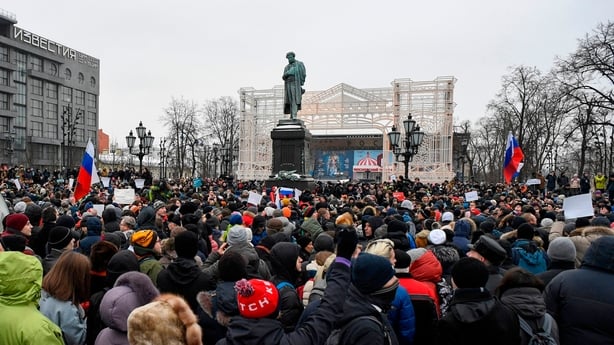Russian opposition leader Alexei Navalny was released from police custody this evening after a brief appearance at a rally in Moscow calling for the boycott of a March presidential election that he said would be a rigged.
Mr Navalny's lawyer, Olga Mikhailova, said that her client had been released without charge but would have to face court at a later date.
If charged with violating laws on holding demonstrations, Mr Navalny could face up to 30 days in jail.
Earlier today, Russian police detained Mr Navalny, moments after he appeared at the Moscow rally.
We need your consent to load this rte-player contentWe use rte-player to manage extra content that can set cookies on your device and collect data about your activity. Please review their details and accept them to load the content.Manage Preferences
The anti-corruption activist had joined hundreds of his supporters on a nationwide day of protest, calling on voters to boycott what they claim would be a rigged presidential election on 18 March.
Video footage posted on social media showed Mr Navalny appear on Moscow's main thoroughfare, a few hundred metres from the Kremlin, to join several hundred supporters taking part in the protest, which authorities had said was illegal.
He had only walked a short distance before he was surrounded by helmet-clad police officers.
Mr Navalny's personal Twitter feed carried a post to his followers saying he had been arrested.
"That does not matter. Come to Tverskaya. You're not coming out for me, but for your future," the post said.
Задержание одного человека теряет малейший смысл, если нас много. Кто-нибудь, придите и замените меня pic.twitter.com/TODVdF5lEm
— Alexey Navalny (@navalny) January 28, 2018
Earlier, police raided Mr Navalny's Moscow headquarters forcing their way into his office using power tools, citing reports of a bomb threat, an online feed run by Mr Navalny's supporters showed.
Mr Navalny has been barred from running in the 18 March election which polls show incumbent president Vladimir Putin is on track to easily win.
Though he has said he knows Mr Putin will be re-elected, his spoiler campaign is aimed at lowering voter turnout to try to take the shine off a Putin win.
Six of Mr Navalny's allies were detained during the police raid, OVD-Info, an independent monitoring group, said.
It said they were among more than 60 people detained across Russia today.
Police shut down a TV studio at Mr Navalny's office during the same raid which had been broadcasting online news bulletins, but another studio in a different location continued to operate.

In the Urals city of Yekaterinburg, just under 1,500km east of Moscow, around 1,000 protesters gathered in temperatures of nearly -10C to back Mr Navalny's boycott call.
"No election? No to elections," a placard being held by one young man read. Other protesters waved Russian flags or red and white placards calling for a boycott.
Mr Navalny's supporters said they expected thousands of people to take part in similar demonstrations in 118 towns and cities.
"Your own life is at stake," Mr Navalny said in a pre-protest video. "How many more years do you want to live with these thieves, bigots and creeps?"
Police warned beforehand they would harshly suppress any illegal protest activity and authorities refused to authorise events in Moscow and St Petersburg, the country's two biggest cities, raising the possibility of clashes.
There was a heavy police presence in central Moscow to coincide with the protest, with a command centre and buses filled with policemen parked on side streets.
Mr Navalny, a lawyer who has campaigned against official corruption, was barred from running for the presidency by the central election commission in December over what he said was a trumped-up suspended prison sentence.
The United States and the EU criticised the decision.
Mr Putin, who has dominated the Russian political landscape for nearly two decades, described US criticism of the election commission's decision as crude interference in Russia's internal affairs and suggested Mr Navalny was Washington's pick for the presidency.

